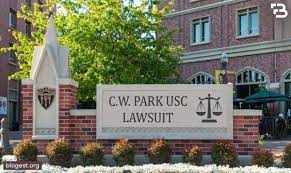In recent years, the College of Southern California (USC) has been caught in a high-profile lawsuit recorded by past teacher c.w. park usc lawsuit. The lawsuit, which was documented in 2018, charges discrimination and reprisal against Park during his time at USC. This controversy has gathered widespread consideration and brought up issues about the college’s treatment of variety and inclusion issues. In this blog entry, we will dig into the subtleties of the C.W. Park USC lawsuit, inspecting the charges, official procedures, and impact on the college’s standing.
C.W. Park’s Discrimination Lawsuit against USC
The lawsuit recorded by C.W. Park against USC centers around charges of discrimination and counter in view of his race and public beginning. Park, who is of Korean descent, was a tenured teacher at USC’s Marshall School of Business for over 20 years before he was finished in 2017. C.W. park usc lawsuit claims that he faced continuous discrimination and provocation from colleagues and managers, including being dismissed for advancements and increases in compensation.
Park additionally affirms that he was fought back against for standing in opposition to these discriminatory practices. He claims that after he detailed incidents of discrimination to the college’s organization, he faced increased scrutiny and was at last ended without noble motivation. These claims portray a toxic work climate at USC, one that conflicts with the college’s expressed commitment to variety and inclusion.
Allegations of Discrimination and Retaliation in Park’s Lawsuit
The nuances of Park’s lawsuit against USC are disturbing and uncover an illustration of discrimination and counter that crosses a long time. According to court documents, c.w. park usc lawsuit that he was subjected to threatening comments and racial slurs from colleagues and supervisors, including being called “chink” and “Korean mafia.” These incidents were not detached, with Park charging that he faced continuous discrimination and goading throughout his time at USC.
Besides, c.w. Park USC lawsuit claims that he was ignored for advancements and salary increases despite having a heavenly record of teaching and research. He affirms that this was because of his race and public beginning, as less qualified colleagues were advanced and received more significant compensations. This affected Park’s career advancement as well as fundamentally affected his income and financial strength.
As well as facing discrimination, c.w. Park USC lawsuit likewise claims that he was fought back against for standing in opposition to these practices. He charges that in the wake of revealing incidents of discrimination to the college’s organization, he faced increased scrutiny and was at last ended without admirable motivation. This counter affected c.w. park usc lawsuit work as well as caused close-to-home pain and harm to his standing.
C.W. Park’s Role at USC and Subsequent Termination
C.W. Park was an exceptionally respected teacher at USC’s Marshall School of Business, where he showed promoting and consumer conduct. He joined the faculty in 1996 and quickly laid down a good foundation for himself as a main master in his field, distributing various articles and books and receiving accolades for his teaching and research. However, regardless of his accomplishments, Park’s time at USC was damaged by charges of discrimination and counter.
Park’s termination from USC in 2017 surprised many due to his established residency and contributions. Court cites “performance issues” for non-renewal; Park alleges discrimination, citing no prior negative assessments at USC.
The unexpected and unexpected end of a tenured teacher like C.W. park usc lawsuit brought up issues about the college’s decision-production process and possible predispositions.
University’s Response to Park’s Lawsuit
In light of c.w. park usc lawsuit has prevented all claims from getting discrimination and reprisal. The college put out an announcement saying that they “treat all charges of discrimination and badgering in a serious way” and that they have “vigorous policies and procedures in place to address such matters.” However, the college’s actions and treatment of the case have been called into question by a lot of people.
One of the crucial criticisms of USC’s reaction to the lawsuit is their lack of transparency. Notwithstanding being a confidential establishment, USC receives government sponsorship and is consequently subject to Title VII of the Civil Opportunities Act of 1964, which prevents business discrimination in light from getting race, color, religion, sex, and public start. This implies that USC is expected to examine and address any claims of discrimination or badgering in the workplace. However, the college has not publicly disclosed any discoveries or actions taken because of Park’s claims.
Moreover, USC has faced criticism for its treatment of variety and inclusion issues overall. In recent years, the college has faced different scandals including high-profile faculty individuals accused of sexual misconduct and racial discrimination. These incidents have raised concerns about the college’s culture and whether it really regards assortment and inclusion.
Legal Proceedings and Timeline of the Lawsuit
The C.W. Park USC lawsuit has been continuous since it was documented in 2018. The judicial actions have been complex and drawn out, with the two players introducing evidence and contentions to help their positions. Here is a timetable of the vital occasions in the lawsuit:
June 2018: C.W. Park records a lawsuit against USC, charging discrimination and counter.
September 2018: USC records a movement to excuse the lawsuit, contending that Park’s claims are without merit.
January 2019: An adjudicator denies USC’s movement to excuse the lawsuit, allowing the case to proceed.
April 2019: USC documents a counterclaim against Park, accusing him of slander and breach of contract.
September 2019: Park documents a movement to excuse USC’s counterclaim, contending that it is retaliatory in nature.
October 2019: An adjudicator denies Park’s movement to excuse USC’s counterclaim, allowing it to proceed.
February 2020: The court orders the two players to enter intervention to endeavor to reach a settlement.
June 2020: Intercession falls flat, and the case proceeds to preliminary.
January 2021: The preliminary starts, with the two players introducing their contentions and evidence.
March 2021: The jury tracks down C.W. Park, awarding him $5 million in penalties.
April 2021: USC records an allure, challenging the jury’s decision and looking for a new preliminary.
The legal procedures in the C.W. Park USC lawsuit have been extended and costly for the two players. However, the outcome of the preliminary has significant implications for the college and its standing.
Impact of the Lawsuit on USC’s Reputation
The C.W. Park USC lawsuit altogether affects the college’s standing, both locally and broadly. The claims of discrimination and counter against a tenured teacher have raised concerns about the college’s culture and treatment of minority faculty individuals. This has prompted increased scrutiny and criticism from understudies, graduated class, and the overall population.
Moreover, the preliminary and ensuing verdict certainly stand out to USC and its treatment of variety and inclusion issues. The $5 million awarded to C.W. Park in harms isn’t just a financial blow to the college yet additionally a blow to its standing. It communicates something specific that USC has neglected to address discrimination and reprisal in the workplace, regardless of its expressed commitment to variety and inclusion.
The impact of the lawsuit on USC’s standing isn’t restricted to the present. It will probably meaningfully affect the college’s capacity to attract top ability, both faculty and understudies. It additionally brings up issues about the college’s qualities and whether it really focuses on variety and inclusion in its policies and practices.
Settlement or Resolution of the Lawsuit
At this point, the C.W. Park USC lawsuit has not been settled or settled. USC has recorded an allure, challenging the jury’s decision and looking for a new preliminary. This implies that the judicial actions will continue, and the outcome is as yet uncertain. However, no matter what the last verdict is, the impact of this lawsuit on USC and its standing will be significant.
In the event that the verdict is maintained, it could prompt a significant financial settlement for C.W. Park and further harm to USC’s standing. Then again, in the event that the verdict is upset, it could raise concerns about the reasonableness and effectiveness of the general set of laws in tending to discrimination and counter-cases. One way or another, the goal of this lawsuit will have implications for USC and different foundations facing comparative issues.
Lessons Learned and Implications for USC
The C.W. Park USC lawsuit fills in as a cautionary story for colleges and associations overall. It underscores the significance of cultivating variety and inclusion in the workplace and tending to discrimination and badgering charges genuinely. It likewise shows the expected consequences of neglecting to effectively resolve these issues.
For USC, this lawsuit ought to act as a wake-up call to rethink its policies and practices regarding variety and inclusion. It ought to likewise provoke the college to investigate culture and address any systemic issues that might contribute to discrimination and counter it. The inability to do so could bring about additional harm to the college’s standing and likely lawful repercussions.
Case Study on Discrimination and Employment Law
The C.W. Park USC lawsuit is a great representation of the intersection of discrimination and business law. It likewise exhibits the complexities of these cases and the importance of exhaustive examinations and fair treatment.
This case study is essential for students, HR professionals, and anyone interested in business law, diversity, and inclusion. It offers real-life examples illustrating legal concepts and their impact on individuals and organizations.
Conclusion
The C.W. Park USC lawsuit has been an exceptionally publicized and controversial case that has brought up significant issues about discrimination and reprisal in the workplace. The claims made by Park against USC are serious and feature the requirement for associations to focus on variety and inclusion and address any issues instantly and effectively.
As the judicial actions continue, the outcome of this lawsuit will have significant implications for USC and its standing. It’s a discrimination and labor law case study, offering valuable insights for both students and professionals. At last, this controversy encompassing C.W. Park and USC ought to act as a wake-up call of the importance of creating a fair and inclusive workplace for all representatives.

